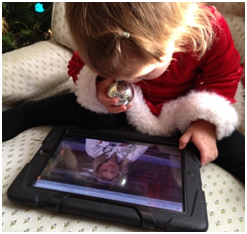The average American teen has 300 Facebook “friends” according to new data out this week from the PEW Internet and American Life Project , yet only 60% set their Facebook profiles to private (friends only). 53% post their email addresses and 20% post their cell phone numbers. Is there such thing as a private life for our next generation?
As a physician I’ve been indoctrinated with HIPPA and patient privacy rules. We go to great extremes in health care to protect patient privacy, and spend a lot of tax payer dollars to do it. But when it comes to Facebook and the internet… not much seems private anymore.
 Privacy is changing. What does that mean for kids?
Privacy is changing. What does that mean for kids?
The researchers at PEW have put together a great infographic that summarizes their report on teens, social media, and privacy.
The easiest way to protect kids is to monitor their online activity, right? Be their Facebook friend. Follow them on Twitter. Know who they are interacting with online. Be sure your kids are not Facebook friends with people they have never met in person. Yet according to this new data from PEW, only 70% of teens on Facebook are Facebook friends with their parents, and 33% are Facebook friends with people they have not met in person.
More teens are also getting access to uncensored internet. Our schools, libraries, and most workplaces limit internet access. My own hospital has filters for certain types of images and marketing. But with the boom in mobile technology, teens are getting access to uncensored internet in increasing numbers. Check out this data on Teens and Technology from the Berkman Center for Internet and Society at Harvard University:
- 78% of teens now have a cell phone, and almost half (47%) of them own smartphones. That translates into 37% of all teens who have smartphones, up from just 23% in 2011.
- 23% of teens have a tablet computer, a level comparable to the general adult population.
- 95% of teens use the internet.
- 93% of teens have a computer or have access to one at home. Seven in ten (71%) teens with home computer access say the laptop or desktop they use most often is one they share with other family members.
Looking at this data another way, about a quarter of teens don’t share their computer with family members and/or have a smart phone or tablet. Are teens really old enough to have uncensored internet whenever and wherever they want? Especially if they don’t seem very concerned about privacy?
What’s really the risk to our children of being totally open, out there?
- You can’t take it back: Once it’s out there, your personal data, pictures, and stories can be very hard to get off the internet. Do you want the whole world to know what you were like as a teen forever?
- Directed marketing, lots of it: Teens are especially susceptible to marking. The teen brain is not fully matured, causing teens to be famous for risk-taking behavior. As online targeted marketing grows, it will be harder for them to resist the temptations.
- Wasted time: Online reputations take time to manage. I tell my kids: time is your greatest gift—use it wisely.
- Cyperbullying : Nearly 43% of kids have been bullied online. 1 in 4 has had it happen more than once. Bullying victims are more likely to commit suicide.
- Online sexual preditors: They are real, and they can be hard for law-enforcement to catch. Be sure your kids never meet up in person with anyone they met online.
- Identity theft: According to PEW, 53% post their email addresses and 20% post their cell phone numbers online. All an identity thief has to do is scrape your child’s birthday and photo from their Facebook account and the sky’s the limit…
What have you done to keep your kids safe online? How old is old-enough for a smart phone with a data plan? How do you monitor their online activities? What’s your take-away from these new statistics? Is online privacy a lost cause?





Hey Kathleen, I’m with you on some of these, not on others.
1) You can’t take it back. So what?
2) Direct marketing: teach them to recognize it.
3) Wasted time. Online reputation management isn’t a waste of time. Take it from someone who really, really knows.
4) Cyberbullying: Real bullying, cyberbullying. Either way, bullying.
5) Sexual predators: with you there. Absolutely dangerous.
6) ID theft: yeah, but that one really is a lost cause.
This comments were originally more in response to other comments on Kathleen’s FB feed…thus they are not as well tailored as I would like for a comment ostensibly in reaction to this piece. However, with the exception of this bit, I am just going to copy and paste what I wrote earlier.
My point of clarification is this: I argue for a shift in emphasis from “privacy” to “tolerance” because ignoring the massive linguistic fallacy of continuing to use the word “privacy” for matters that really are more about shielding the individual from persecution, etc in the public sphere, “tolerance” is by far the solution which cuts the corners that need to be cut.
What we are dealing with is simple. Anyone with rudimentary physiological psychology training, even the most rudimentary introductory course work, should never forget that fundamentally humans are hard wired for two basic reactions.
We either retreat from the situation (flight) or we become aggressive towards the situation (fight).
These are old biological imperatives that serve us little today. Neither is good as constantly retreating from perceived threats is disempowering and weakens self-agency.
However, it may be worse to react aggressively, at least as social repercussions go.
Cyber bullying etc can, yes stem from many things, however, I will gamble a prime conjecture, that most of the time, this acts of hostility aimed at harming or even pushing another person to literal death, really arises from conscious or unconscious perceptions of threat to self.
We need to learn to educate and contain ourselves such that we aggressively react to really dire, true, and genuine threats (another person not liking your clothes or not looking like you is not a “real” threat), while self-soothing and self-regulating the emotional system downward during threats that are irrational, subjective, and ultimately, petty and meaningless.
Developing and fostering a culture of tolerant strength is key. People need to take pride in realizing that unless another person is literally hitting them over the head with a two by four if that other person looks at one critically or even verbalizes things critically, we are never, ever so weak that the mere existence of someone/something contrary to us can actually cause us harm.
i sincerely see “privacy” as a slap-stick or half-shod attempt to protect individual expression but the problem is that “privacy” is just not even linguistically/semantically of relevance nor is the term accurately used anymore given that many “privacy” issues are actually matters that are quite obviously in the public sphere and what we need to develop is a move towards tolerance, especially in the very specific sense that people need to learn to stop feeling threatened, persecuted, etc by another’s expression of self when that expression doesn’t objectively nor significantly impact one’s own life. intolerance is actually a truly pathetic expression of irrational fear, for example, what objective data do we have that shows that a marriage of A will significantly impair the existence of C? pride is, yes, a stumbling block at times, at other times? it is infinitely valuable, and it is time for people to be confronted with the shame of their intolerance. if, merely by virtue of it’s existence, Z detrimentally affects Y, then maybe Y needs to do some reassessing, regrouping, etc, and figure out why it is that Y by simply “being” can cause so much harm to Z, as having spend much of my adult life in scientific inquiry, particularly psychological matters, i know, that is only humans, that to our knowledge, display an actual “causal” effect between utterly unrelated things (at least in rationale and objective measures) because people perceive a connection that is not there…as the saying goes, it’s all in the mind…
It’s really actually quite disturbing really, as much of our historical record in regards to wide scale violence, bloodshed, etc, was often on the basis of what F might do to H, in fact at the moment, there are no instances of conflict i can think of in which…well maybe World War II and America’s shift from non-involvement to joining the Allied Powers, anyway, what I was trying to say, is there a few historical events where aggressive force was used by one party against another because of objective, rationale, and empirical evidence aggregated so much so that non-action would be ludicrous. some classic examples, Hitler’s use of antisemitism that was never objectively substantiated. i understand that at that time, the “Jewish” community in certain parts of the world held a great deal of financial wealth because of the whole usury laws…but then “Jewish” people in say, Russia were, i think at a over lapping period of history, totally destitute. was Hitler right or wrong in his placement of animosity? who cares, I think the bigger question is that did anyone really bother to research the entire situation, or did, once again, a massive conflict explode because some people felt that other people were ruining their lives despite a lack of substantive evidence supporting this fear? another classic example is the whole Protestant massacre/persecution by Catholic interests because apparently the existence of said Protestants was so horrible and so detrimental to the Catholics they absolutely had to kill all contrary opinion…literally…or they would implode? this kind of thinking is tantamount to superstitious thinking in which A perceives, essentially invisible, unsubstantiated connections between self and L, something utterly unrelated for all intents and purposes, but that perception of connection is such that it actually impairs A, think self-defeating prophecies for example. A can kill L all A wants, however, until A learns to successfully exist regardless of what L is doing, A will merely spend eternity chasing shadows…and this is what humans persist in doing within the current “defense of privacy” paradigm…
Kathleen,
Thank you for writing about this. We need as many people as we can trying to help adults understand what our children are being exposed to. I have spent the last 7 years working on this very subject. I speak all over North America. I have written an online curriculum that addresses real life, age appropriate issues.
Generation Text Online is a 21st Century programming approach to anti-bullying behaviors. Generation Text Online provides a “Digital Citizenship Curriculum for Kindergarten through grade 12,” and meets Common Core Standards and State Laws requiring anti-bullying curricula in the public school classroom. Our programs provide solutions to STOP cyber-bullying, bullying behaviors and they also incorporate strategies and techniques to all who are concerned about this negative behavior. We approach all of this through the use of technology and the desire of students to use their 21st century brain.
I disagree with the gentlemen who says that anything is a lost cause. Perhaps he does not understand the devastating effects of some of these things or he has never seen a solution that actually works. If you or your readers are interested in seeing some of these lessons and how it works, please contact me at [email protected]